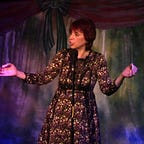Through Improvisation, Our Infinite Imaginations Shape The Future
Great change is like an express train. But the escalating pace of change we are living through right now is more like the time-jumping train Doctor Emmet Brown takes to visit Marty in the very last scene of Back To The Future. It reshapes reality at the same time we have to respond to it. The intensity of transformation in today’s world tilts the human psyche toward fear and a search for safety — usually by looking to the old familiar, to what was reliable and predictable — even if those conditions no longer exist. This makes improvisation training a uniquely valuable investment right now, because it engages the brain and mind right at that psychological intersection between anxiety about the unknown and curiosity about it.
“Our problems often come when we cling to old realities and resist embracing the new,” explains Seattle improviser, trainer, and Public Radio Journalist Guy Nelson, author of Creative Thinking, Creative Play: Using Improvisational Games To Transform People, Classrooms and Organizations. “Maybe our minds aren’t used to such quick mental gymnastics or we fear taking a different tack will end in failure. One of the most useful facets of improv is how we quickly learn to accept new realities.” In an interview about his book and work as a trainer, Nelson explained why improvisation is exceptionally effective for helping us ride the waves of uncertainty and avoid some of the defensive psychological minefields that can result.
“People usually enter an improv class in a protective mode, which is entirely normal,” he says. “We’re all conditioned in many ways to protect ourselves, to avoid making mistakes and looking foolish. We protect our egos and our sense of accomplishment or status. And there are usually good reasons for that self-protection. This is so common that I believe it’s the only mode most of us have ever known. But by searching to be right in our response and behavior we ignore the infinite world of other possibilities — possibilities that may lead to inventive solutions or reframe our stories and experiences in the world.”
In protective mode we are tense, have heightened emotional reactions that are focused on potential threats. This can easily become focused on people who embody that threat simply because they are unfamiliar or quite different from ourselves, at the same time our executive functions — what we most need to think things through and solve problems — are dramatically reduced. Improv games are pathways for shifting out of protective mode and into creative mode.
“When we stop being self-protective in groups we see each other in a completely different way,” says Nelson. We’re able to deeply connect and empathize with others. We really listen and in some ways even begin to read each other’s minds. You can see this happen on stage with skilled improv groups, and it emerges in exciting ways among my workshop participants as they transform into creativity mode. This enables them to access their entire life experience without hesitation or fear — thoughts, feelings, memories, dreams, relationships and so on. A very rich mine to draw from!”
Improvisation training is something desperately needed in these times, according to Nelson, and he spells out some very specific reasons:
1) “Improvisation overcomes tribalism. It connects us deeply so that we see the humanity and commonality in one another,” he explains. “Improv games helps us transcend attitudes of ‘us vs them’ and ‘winners or losers’ so we can create things to help solve the many problems and challenges we face today.
2) Improv generates solutions. We can harness our infinite imaginations to come up with ideas and be flexible. If something doesn’t work an improviser will quickly let it go and try something else.
3) It creates stories that are inclusive and diverse. Our past, present and future are all largely determined by the stories we tell.”
We’re all works in progress.
I had a boss once who I really admired for this. In my career in NPR radio journalism we’re always making changes in our programming and protocols. Some staff people were famously resistive and in meetings he’d say, “Let’s make this change and consider it a work in progress. If it doesn’t work we can try something else. Nothing is set in stone.” So that’s how I tend to look at change. We’re all works in progress, nothing is perfect and nothing is set in stone. And at any moment we can be ready and eager to make a change that could well result in a better outcome.
“Over the years I’ve taken many solo journeys to distant places around the world. I’ve found that when I’m ready to set off I tend to get three types of farewell messages from family and friends. One is “Be careful!” from those who see the world as a dangerous place. Another is “Have fun!” from those who see the world as full of good potential. And another (from my father, always) was “Keep your nose clean!” as he was constantly worried that I’d do something to somehow embarrass the family. In all these cases I am the same person, and the world is the same world, but people look at things through different lenses (fear, fun, shame) and create stories based on that. Improv helps us set aside our lenses and preconceptions and asks, “What are amazing stories we can create about the world and our experience in it?” In the games we co-create stories that go beyond our expectations and show us better experiences and outcomes that we can use in our daily lives.” Guy Nelson, trainer/consultant, improviser, NPR Radio Journalist
Jude Treder-Wolff, LCSW, CGP, MT is a trainer/consultant and writer/performer, and President of Lifestage, Inc, a NYS-approved provider of Continuing Education for social workers (provider #0270). Her solo storytelling show This Isn’t Helping will be performed on Thurs Jan 25, 2018 in The Whitefire Solo Theatre Festival in Sherman Oaks, CA.
